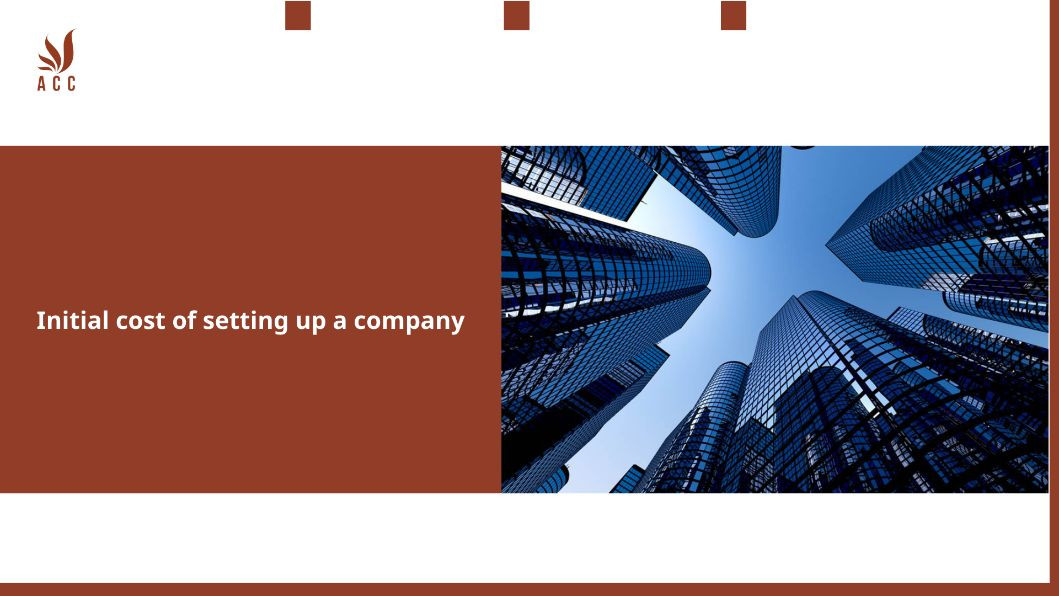The initial costs of setting up a company can vary depending on various factors, such as the type of company, location, industry, and specific requirements. Here are some common initial costs to consider:
1. Company registration fees:
This includes the cost of registering your company with the appropriate government authority, such as Companies House in the UK. The registration fee can range from a few dollars to a few hundred dollars, depending on the jurisdiction.

2. Legal and professional fees:
You may need to consult with professionals such as lawyers, accountants, or business consultants for legal advice, drafting contracts, or other services. The fees for these services can vary based on the complexity of your needs and the professionals' rates.
3. Office setup:
If you require a physical office space, the costs can include rent, security deposits, utilities, furniture, equipment, and office supplies. The expenses will depend on factors such as location, size, and the level of amenities required.
4. Technology and equipment:
This includes the cost of computers, software, telecommunications systems, and other necessary equipment for your business operations. The expenses can vary based on your specific requirements and the quality of the equipment you choose.
5. Marketing and branding:
You may need to invest in marketing activities to promote your company and establish your brand. This can include website development, graphic design, advertising, and marketing materials. The costs will depend on the extent of your marketing efforts and the channels you choose.
6. Licenses and permits:
Depending on your industry and location, you may need to obtain specific licenses or permits to operate legally. The costs can vary based on the type of license or permit required and the regulatory requirements.
7. Insurance:
It's important to consider business insurance to protect against potential risks and liabilities. The cost of insurance will depend on factors such as the type of coverage, the size of your company, and the industry you operate in.
8. Initial inventory or stock:
If your business involves selling products, you may need to invest in initial inventory or stock. The cost will depend on the type of products, quantity, and supplier costs.
9. Miscellaneous costs:
There may be additional expenses such as website domain registration, business cards, signage, initial marketing campaigns, and any other specific needs related to your industry or business model.
10. Q&A
Q1: What are the primary categories of initial costs involved in setting up a company?
A1: The primary categories of initial costs when setting up a company typically include:
- Registration and Legal Fees: Costs associated with registering your business, obtaining licenses and permits, and legal fees for creating necessary documents (e.g., articles of incorporation or partnership agreements).
- Office Space and Equipment: Expenses related to securing office space, leasing or purchasing equipment, and setting up a functional workspace.
- Technology and Software: Costs for acquiring and setting up essential technology and software for your business operations.
- Marketing and Branding: Expenses for developing a brand identity, creating marketing materials, and launching initial marketing campaigns.
Q2: How can I estimate the initial costs specific to my business type and industry?
A2: Estimating initial costs specific to your business type and industry involves conducting a detailed business plan and financial analysis. You should:
- Identify the necessary permits, licenses, and legal requirements unique to your industry.
- Research office space and equipment costs, considering location and size.
- List the technology and software tools required for your operations.
- Develop a marketing and branding strategy and budget for its implementation.
- Consult with industry peers or experts to gain insights into typical startup costs.
Q3: What are some cost-saving strategies to reduce the initial expenses of setting up a company?
A3: Cost-saving strategies to reduce initial expenses include:
- Bootstrapping: Start with minimal resources and gradually reinvest profits.
- Exploring Financing Options: Consider loans, grants, angel investors, or crowdfunding to secure capital.
- Shared Resources: Share office space or equipment with other businesses to lower overhead.
- Virtual Offices: Use virtual offices and remote work arrangements to minimize physical space costs.
- DIY and Online Tools: Leverage free or low-cost DIY solutions and online tools for tasks like website development and marketing.
Q4: Are there any hidden or unexpected costs I should be aware of when setting up a company?
A4: While many initial costs are apparent, some hidden or unexpected expenses to consider may include:
- Compliance Costs: Costs associated with unforeseen regulatory compliance or permit requirements.
- Emergency Funds: Setting aside funds for unforeseen emergencies or unexpected expenses.
- Insurance: The cost of business insurance to protect against various risks.
- Professional Fees: Fees for consulting services or legal advice that may arise during setup.
- Taxes: Understanding tax obligations and ensuring you have funds set aside for tax payments.
Nội dung bài viết:






Bình luận